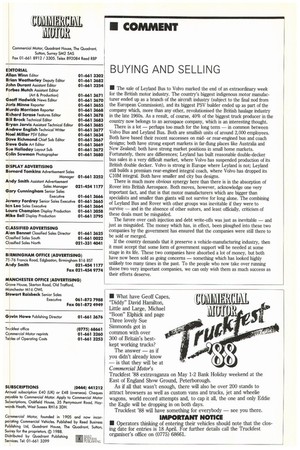BUYING AND SELLING
Page 5

If you've noticed an error in this article please click here to report it so we can fix it.
• The sale of Leyland Bus to Volvo marked the end of an extraordinary week for the British motor industry. The country's biggest indigenous motor manufacturer ended up as a branch of the aircraft industry (subject to the final nod from the European Commission), and its biggest PSV builder ended up as part of the company which, more than any other, revolutionised the British haulage industry in the late 1960s. As a result, of course, 40% of the biggest truck producer in the country now belongs to an aerospace company, which is an interesting thought.
There is a lot — perhaps too much for the long term — in common between Volvo Bus and Leyland Bus. Both are smallish units of around 2,000 employees. Both have based their recent successes on midor rear-engined bus and coach designs; both have strong export markets in far-flung places like Australia and New Zealand; both have strong market positions in small home markets. Fortunately, there are differences; Leyland has built reasonable double-decker bus sales in a very difficult market, where Volvo has suspended production of its British double decker. Volvo is strong in Europe where Leyland is not; Leyland still builds a premium rear-engined integral coach, where Volvo has dropped its ClOM integral. Both have smaller and city bus designs.
There is much more obvious synergy here than there is in the absorption of Rover into British Aerospace. Both moves, however, acknowledge one very important fact, and that is that motor manufacturers which are bigger than specialists and smaller than giants will not survive for long alone. The combining of Leyland Bus and Rover with other groups was inevitable if they were to survive — and in the absence of other suitors, and least officially, criticism of these deals must be misguided.
The furore over cash injection and debt write-offs was just as inevitable — and just as misguided. The money which has, in effect, been ploughed into these two companies by the government has ensured that the companies were still there to be sold or merged.
If the country demands that it preserve a vehicle-manufacturing industry, then it must accept that some form of government support will be needed at some stage in its life. These two companies have absorbed a lot of money, but both have now been sold as going concerns — something which has looked highly unlikely too many times in the past. To the people who now take over running these two very important companies, we can only wish them as much success as their efforts deserve.
• What have Geoff Capes, (All "Diddy" David Hamilton, Little and Large, Michael "Boon" Elphick and page Three lovely Sue Simonds got in common with over 300 of Britain's bestkept working trucks?
The answer — as if you didn't already know — is that they will be at Commercial Motor's Truckfest '88 extravaganza on May 1-2 Bank Holiday weekend at the East of England Show Ground, Peterborough.
As if all that wasn't enough, there will also be over 200 stands to attract browsers as well as custom vans and trucks, jet and wheelie wagons, world record attempts and, to cap it all, the one and only Eddie the Eagle will be dropping in on both days.
Truckfest '88 will have something for everybody — see you there.
IMPORTANT NOTICE
• Operators thinking of entering their vehicles should note that the closing date for entries is 18 April. For further details call the Truckfest organiser's office on (0775) 68661.




































































































































